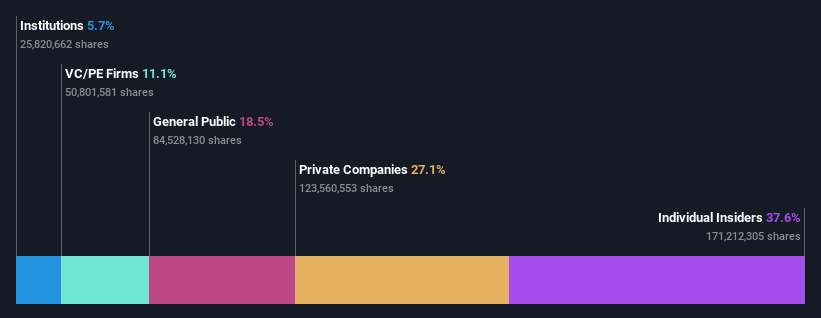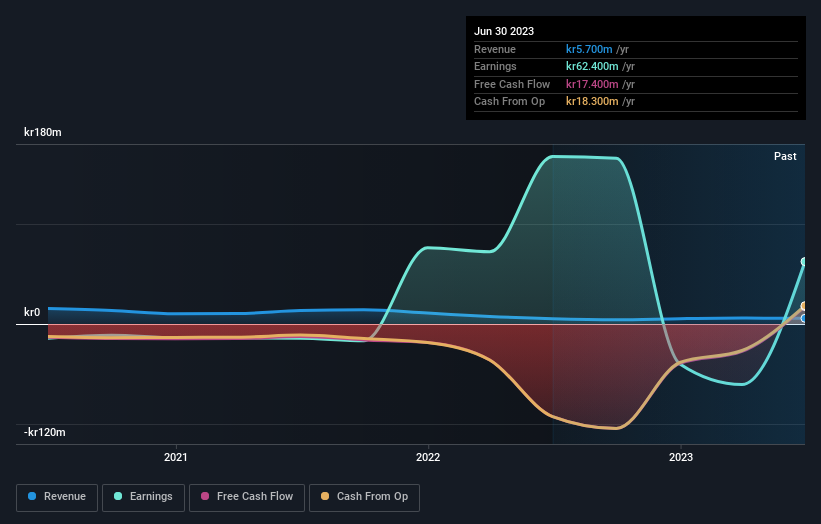- Sweden
- /
- Construction
- /
- OM:DOXA
Recent 11% decline may not have gone down well with Doxa AB (publ) (STO:DOXA) insiders who've been purchasing recently

Key Insights
- Significant insider control over Doxa implies vested interests in company growth
- 58% of the business is held by the top 5 shareholders
- Recent purchases by insiders
Every investor in Doxa AB (publ) (STO:DOXA) should be aware of the most powerful shareholder groups. And the group that holds the biggest piece of the pie are individual insiders with 38% ownership. That is, the group stands to benefit the most if the stock rises (or lose the most if there is a downturn).
A quick look at our data suggests that insiders have been buying shares in the company recently. However, with shares price down 11% last week, they must be disappointed.
Let's take a closer look to see what the different types of shareholders can tell us about Doxa.
Check out our latest analysis for Doxa

What Does The Institutional Ownership Tell Us About Doxa?
Many institutions measure their performance against an index that approximates the local market. So they usually pay more attention to companies that are included in major indices.
We can see that Doxa does have institutional investors; and they hold a good portion of the company's stock. This implies the analysts working for those institutions have looked at the stock and they like it. But just like anyone else, they could be wrong. If multiple institutions change their view on a stock at the same time, you could see the share price drop fast. It's therefore worth looking at Doxa's earnings history below. Of course, the future is what really matters.

Hedge funds don't have many shares in Doxa. Our data shows that Greg Dingizian is the largest shareholder with 13% of shares outstanding. Lena Grimslatt is the second largest shareholder owning 12% of common stock, and Malmö Bra Bostad Ab holds about 11% of the company stock.
To make our study more interesting, we found that the top 5 shareholders control more than half of the company which implies that this group has considerable sway over the company's decision-making.
While it makes sense to study institutional ownership data for a company, it also makes sense to study analyst sentiments to know which way the wind is blowing. Our information suggests that there isn't any analyst coverage of the stock, so it is probably little known.
Insider Ownership Of Doxa
The definition of company insiders can be subjective and does vary between jurisdictions. Our data reflects individual insiders, capturing board members at the very least. The company management answer to the board and the latter should represent the interests of shareholders. Notably, sometimes top-level managers are on the board themselves.
I generally consider insider ownership to be a good thing. However, on some occasions it makes it more difficult for other shareholders to hold the board accountable for decisions.
Our information suggests that insiders maintain a significant holding in Doxa AB (publ). It has a market capitalization of just kr1.4b, and insiders have kr514m worth of shares in their own names. This may suggest that the founders still own a lot of shares. You can click here to see if they have been buying or selling.
General Public Ownership
With a 19% ownership, the general public, mostly comprising of individual investors, have some degree of sway over Doxa. While this group can't necessarily call the shots, it can certainly have a real influence on how the company is run.
Private Equity Ownership
With a stake of 11%, private equity firms could influence the Doxa board. Some might like this, because private equity are sometimes activists who hold management accountable. But other times, private equity is selling out, having taking the company public.
Private Company Ownership
Our data indicates that Private Companies hold 27%, of the company's shares. It's hard to draw any conclusions from this fact alone, so its worth looking into who owns those private companies. Sometimes insiders or other related parties have an interest in shares in a public company through a separate private company.
Next Steps:
I find it very interesting to look at who exactly owns a company. But to truly gain insight, we need to consider other information, too. Take risks for example - Doxa has 4 warning signs (and 2 which are a bit concerning) we think you should know about.
Of course, you might find a fantastic investment by looking elsewhere. So take a peek at this free list of interesting companies.
NB: Figures in this article are calculated using data from the last twelve months, which refer to the 12-month period ending on the last date of the month the financial statement is dated. This may not be consistent with full year annual report figures.
New: Manage All Your Stock Portfolios in One Place
We've created the ultimate portfolio companion for stock investors, and it's free.
• Connect an unlimited number of Portfolios and see your total in one currency
• Be alerted to new Warning Signs or Risks via email or mobile
• Track the Fair Value of your stocks
Have feedback on this article? Concerned about the content? Get in touch with us directly. Alternatively, email editorial-team (at) simplywallst.com.
This article by Simply Wall St is general in nature. We provide commentary based on historical data and analyst forecasts only using an unbiased methodology and our articles are not intended to be financial advice. It does not constitute a recommendation to buy or sell any stock, and does not take account of your objectives, or your financial situation. We aim to bring you long-term focused analysis driven by fundamental data. Note that our analysis may not factor in the latest price-sensitive company announcements or qualitative material. Simply Wall St has no position in any stocks mentioned.
About OM:DOXA
Adequate balance sheet slight.

